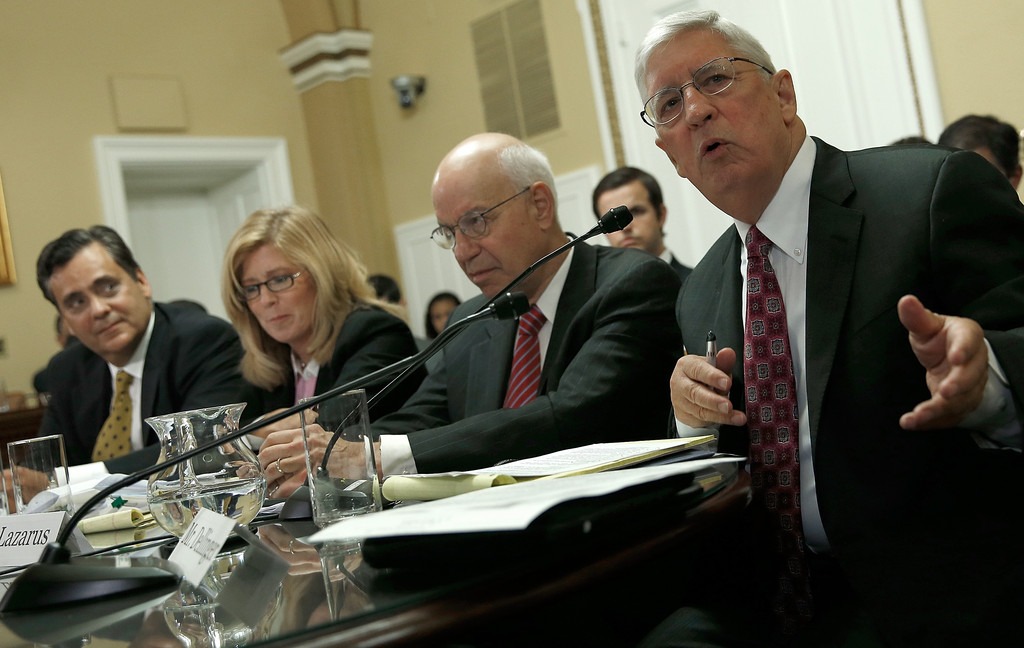At 10 a.m. on July 16, Texas Republican Pete Sessions called the House Rules Committee to order, and for two hours, members of the committee heard three accomplished constitutional scholars debate the principles of representative government established by the framers of the Constitution in 1776 and reaffirmed by the men who gave their last full measure of devotion to keep the Union intact between 1861-1865.
Duke Law School Professor Walter Dellinger has served as acting U.S. solicitor general, assistant attorney general, and director of the White House Office of Legal Counsel.
In 2010, Georgetown Law School Professor Jonathan Turley defended an impeached federal judge on the floor of the Senate and in 2011, he was the attorney for the 10 members of Congress who challenged the president’s authority to use military force in Libya.
Simon Lazarus is senior counsel at the Constitutional Accountability Center and served as assistant director of Jimmy Carter’s White House Domestic Policy Office. All three are prolific writers and frequent witnesses before congressional committees.
“The particular alleged infraction here, namely the delay in implementation aspects of the ACA employer mandate, seems to be a relatively minor and very routine type of occurrence … not very compelling from a legal standpoint.”—Simon Lazarus
The hearing became a runaway debate, with Dellinger and Lazarus confronting Turley on the authority of Congress to file suit against the president. A fourth witness, a law professor from Florida, was out of her league and less engaged as the three lawyer-scholars collaborated on a magisterial constitutional law lesson.
Yet the Rules Committee’s decision on the subject of debate was preordained. Speaker of the House John Boehner had already decided to sue the president, because he had twice delayed the implementation of the “employer mandate” in the Affordable Care Act.
From the dais, Massachusetts Democrat James McGovern explained:
This has nothing to do with constitutional law. It has everything to do with politics. You know, a couple of weeks ago, when the speaker was talking about suing the president, there were a hundred different subjects on the table, everything from Sergeant Bergdahl to immigration, and whatever—somebody got in a room and decided they’re going to focus in on a piece of the Affordable Care Act … [I]t really doesn’t matter if all of you agreed that suing the president was a bad idea. They’re going to do it anyway.
The witnesses pressed on with their testimony, explicating the constitutional role of the Third Branch as an arbiter of disputes between the Congress and the president; the authority of one house of Congress to sue the president without the consent of the other; other remedies available to the Congress before filing suit; the risk of surrendering more authority to the Third Branch while the Roberts Court is encroaching on the authority of Congress.
Dellinger said the Congress could fix the problem if it would come together and pass a law compelling the president to implement the provision in question. “[O]ver more than two centuries,” he said “we’ve gone by with lots of clashes between the Congress and the president without there having been a need to have the president sue the Congress or the Congress sue the president.”
Late in the testimony, Lazarus, who with Dellinger had been brought in by the Democratic minority, returned to McGovern’s comments. Lazarus didn’t agree with suing the president, but he argued that other transgressions alleged by Obama’s critics—the president’s executive order providing temporary legal status for 673,413 young immigrants illegally in the country or his exchanging Bowe Bergdahl for five Guantánamo detainees without consulting Congress—might provide a better cause of action in a lawsuit. Lazarus said:
“The particular alleged infraction here, namely the delay in implementation aspects of the ACA employer mandate, seems to be a relatively minor and very routine type of occurrence … not very compelling from a legal standpoint.”
There it was.
A president under attack for exceeding his constitutional mandate was going to be sued for delaying the implantation of one provision in a law.
The House Republicans cannot help themselves. Obamacare is the white whale they have stalked since the president signed the bill into law in March 2010, and as the midterms approached it was the singular issue that would inflame their base.
Two weeks after the hearing, the House voted 225-20 to sue the president. No Democrat voted for the measure. Five Republicans voted no. Three of the five representatives who broke with their conference have since made the argument that they prefer impeachment to litigation.
Lou Dubose is the editor of The Washington Spectator.



0 Comments